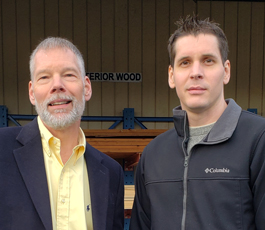
Richard Wickizer, Wickizer & Associates, LLC, boasts of more than $5 million in annual sales representing building products within the building envelope.
Rick Wickizer humorously recalls that rice and beans were a staple on his dinner table when he opened his agency more than a decade ago.
According to Wickizer, Wickizer & Associates, Woodland, Washington, “Thankfully I had some savings and other resources because initially I knew I wasn’t going to make a lot of money.” He couldn’t have been more correct in anticipating a lack of income since he only turned a very modest profit during that first year.
In a nutshell, here’s how Wickizer got to where he is today: During the last recession, after the building industry collapsed, Wickizer cashed his last severance check and launched Wickizer & Associates. He knew that he could work hard enough, adding value to others in the building industry, that eventual success was inevitable. Taking on any line he could secure, the rep quickly built a profitable firm, earning just over $3,000 in profits that first year. Today, Wickizer & Associates has grown annual sales to more than $5 million and has become highly focused, representing building products within the building envelope.

Wickizer’s son Chad (right) serves as the agency’s partner, vice president and Western Washington territory manager, handling the tracking of project sales and architect outreach.
Wickizer has involved his oldest son Chad as partner and vice president and Western Washington territory manager, handling the tracking of project sales and architect outreach. Also, new to the agency is Garritt Stever, Idaho territory manager.
According to Wickizer, “We remain founded in our mission to add value and to serve our clients with knowledge and integrity. We want to keep our product focus narrow and limited so we can effectively serve the objectives of the manufacturer, designer, builder and distributor.”
Making the Move
Expanding on the circumstances that led him to opening his own agency doors, Wickizer explains that the move “was out of necessity. I had more than 30 years’ experience selling building materials when the company I was working for cut all of its sales staff and made the move to the rep business model. At that point, armed with just three months’ severance, I had some decisions to make. Most other manufacturers in the building materials industry weren’t hiring, or if they were, it was at a fraction of the income I had been earning. It was then that I considered launching a rep agency. I knew reps in my industry were all doing well, so I thought, ‘I can do this.’ I knew launching in a recession was a challenge, but if I could make it work during a recession, when things picked up, I’d be in good shape.”
Bolstering his confidence that opening an agency was the right choice, Wickizer explained, “I knew I wasn’t going to make a lot of money at the start, but the fact is I knew the industry and if I practiced the fundamentals of good business and strong selling behavior, I could be successful.”
He added, “I knew from the beginning that being a rep was a lot different than being a direct salesperson. As a rep, you’re not only involved in sales, but in running a business. As a result, you’ve got to divide your energies between the two. That’s not something that all manufacturers understand. So, while we’re busy selling, we’ve also got to maintain the profitability of our agencies.”
It’s with those thoughts in mind that he says he joined MANA. “Thankfully, I’ve got a number of friends who are reps and they strongly suggested that I join the association. It was a great decision as membership provided me with the business framework I would have never considered.”
As he looks back at his early days as a rep, Wickizer maintains, “I thought I had a fairly good idea of what it took to be successful; however, so much of what I had been doing in the past was conducting milk-run sales calls. I simply didn’t want to be a ‘Johnny Box of Donuts’ salesman. I knew that wasn’t the way I wanted to run my agency. My goal was to be effective at the pull-through sales process, meeting with designers and contractors to pull demand into the distribution channel. Once demand has been primed, training the distributor to promote and sell our products is much more impactful.”
Touching Customers
In order to reach that goal of touching customers, Wickizer’s immediate challenge was to get lines to represent. “Early on, most of the lines we took on were gained through our attendance at local and national building industry trade shows. From the beginning I took on any line I could get. Looking back, I should have been a bit more strategic in my approach, but the fact is I was desperate. My immediate goal was to build a good array of manufacturers that I could rep quickly. I will admit, however, that I should have been a lot more particular in the lines I took on. Looking back, I wasted a good deal of time and energy on lines that offered little support and simply weren’t a good fit.”
He did add, however, that one of the first lines he signed remains as his primary line today. “They’re an example of the type of company you want to work with. They are a second-generation, family-run business without a lot of administrative tiers. They serve as an example of someone I can add value to and work with at all levels.”

Wickizer, who like so many other reps, has spent a good deal of his time at his desk during the pandemic, has come a long way from his agency’s early days when rice and beans made a regular appearance at his dinner table.
Inevitably when the subject of getting new lines to represent is raised, it is accompanied by mention of the rep’s willingness to take on missionary lines. Likewise with Wickizer, who recalls, “At the beginning of my agency, probably half the lines were of the missionary variety. That’s simply where I started.” He adds, however, “Now we use a great deal more discretion when it comes to taking on a manufacturer. We’ll consider a line if we feel it’s a good fit and can see that there is a real opportunity there for both of us. But, because of what I’ve read in Agency Sales and learned from the MANAchats I’ve participated in, I won’t hesitate to ask the manufacturer to pay a market development fee for a missionary line. To date, I’ll admit that we’ve only had a couple of conversations with manufacturers on this subject, and most of them have been hesitant. I haven’t picked up any lines with that approach thus far, but the bottom line is that I’m not afraid to walk away if the manufacturer isn’t willing to contribute to our effort and expenses of building a market for a new line.”
The Value of Backselling
Once he’s established relationships with manufacturers, Wickizer explained that he enthusiastically embraced the concept of backselling. “Backselling is something that was foreign to me prior to my exposure to MANA and Agency Sales, but I quickly learned that if you don’t communicate all that you, as a rep do for your principals, they may not see evidence of your work for them. Backselling is something we practice with all of our principals — especially in today’s pandemic environment — including a steady stream of communication, which includes quarterly reports detailing our activity on their behalf.”
The importance of communication and relationships stayed at the forefront of the conversation with Wickizer when the continued impact of the pandemic was raised. According to the rep, “We all need to consider how we conduct business now and how we’ll conduct it in the future. Consider what we face in the Northwest. We can’t go out and visit customers face-to-face unless we make arrangements well in advance and follow various guidelines. Now we have to be much more technically oriented in our approach to sales as we depend more on phones and virtual meetings.”
“Initially the new environment was difficult for me as I felt if you’re not working face-to-face, then you’re really not selling. I’ve made the adjustment, however, and now communicate with customers via our newsletter and using the phone and Zoom meetings.”
He adds that his own adjustment to the new way of selling has been supported by the relationships he and his agency have made over more than 35 years in the building industry. “Now when I make a phone call, the screener will patch me through. I try to be strategic in my connections with customers and have a specific outcome in mind. If I don’t, then I’m just wasting my and the customer’s time.”
As he looks to the future, Wickizer observes that “With all that’s happened in the past year, in terms of how we sell, we’re not going to be able to ‘put the genie back in the bottle.’ Large and small companies are going to have to be able to work remotely, and to be able to do that effectively, relationships are key. That’s to our benefit.”
Wickizer & Associates File
- Founded: 2011
- Territory Covered: We are based out of the Portland, Oregon area, with representatives based in Southwestern Washington, Northwestern Washington and Southern Idaho. We serve the Northwest states of Oregon, Washington, Idaho and Alaska
- Number of Salespeople: 3
- Website: www.wickizer-associates.com
- Trade Associations:
CSI (Construction Specifiers Institute)
BEC (Building Enclosure Council)
IBEC (International Institute of Building Enclosure Consultants)
MANA welcomes your comments on this article. Write to us at [email protected].

